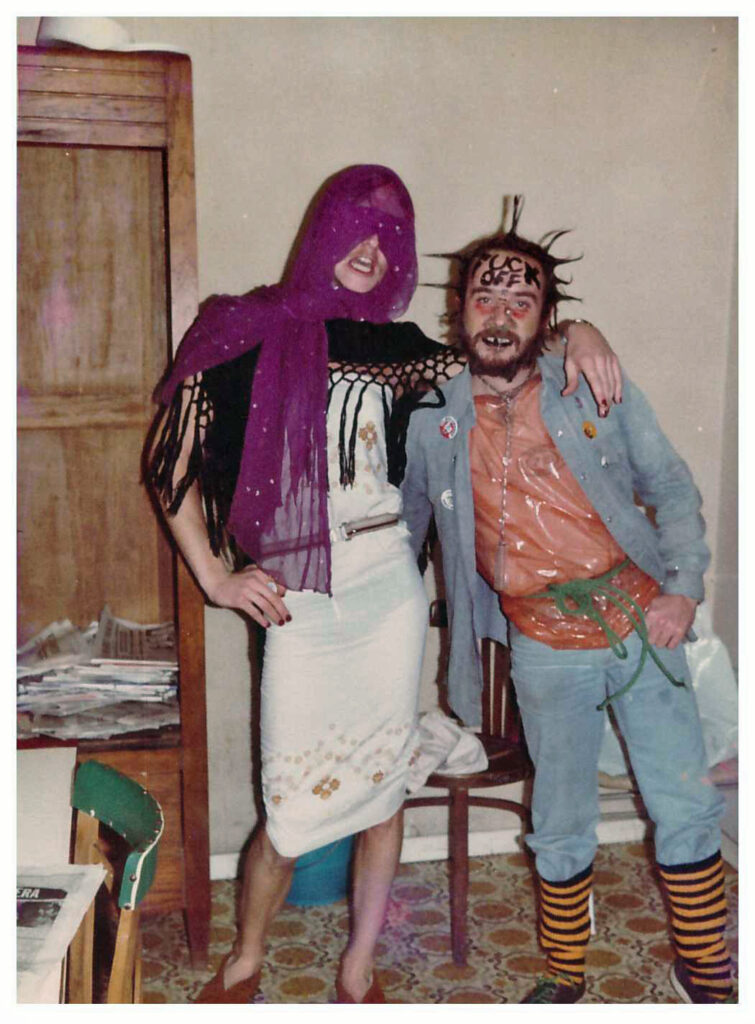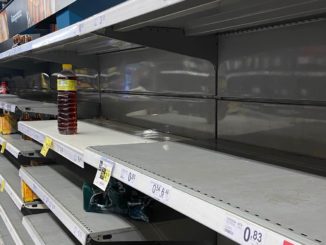OK, I did promise to write about the bad back in pre-history (1980) San Sebastian when I first came ashore. Fair cop.
I also said that there was a lot. (Before I get trolled, Part I deals with the good) That is because there was. Let’s start with SMOKING. Everybody did it. Anywhere. Except, funnily enough, in the cinema, which was really weird to me, used as I was to a ciggie or three in the ABC. Very possibly the unhealthiest spot in San Sebastian was the downstairs band part of a jazz bar that is still going strong, Etxekalte in the port. It was miniscule, dim and completely unventilated. Great as the music was, personally I could only last some 15 minutes before having to bolt, eyes streaming, for the relative fresh air upstairs. Let’s not go into how clothes smelt after a night out. Or how singed, newer clothes attracting burns quicker it appeared. The language school where I worked was on the fourth floor and had wooden stairs, no lift and NO FIRE ESCAPE. Students had a delightful habit of (semi) stubbing their cigarettes out on the stairs before entering. Quite why fails me as nearly everybody smoked in class. Imagine if you will, a class of 14, usually 13 smokers plus teacher puffing away, door and window closed in winter. The only warmth came from a portable butane heater. Probably better not to dwell on that image.
Classes were often interrupted by klaxons from the street below, particularly loud and insistent if it was a bus that couldn’t squeeze past the triple parked car. A quarter of the class would disappear to reorganise the chaos that was Donosti’s “parking system” before metering was introduced. The municipal police went off duty at 8pm and then it was a free for all. Not a square centimetre of pavement (sidewalk) was immune, especially in the centre where people came to eat and drink. If you lived in the centre, as I did, coming back late meant up to half an hour of driving around to find somewhere to leave the car. And gettin up early to move it before it was towed. Making merry and driving was considered completely normal then. “How else are you going to get home!???” You can get an idea of the scale of the problem from the reply of the Chief of Municipal Police when asked by the local newspaper about possibly breathalysing the hordes returning from KU around dawn, quite a few plummeting off the mountain road. “I can’t do that. They’d all be positive!” It was not only alcohol, heroin was rife too, many people believe supplied by state police forces as a way of depoliticising Basque youth.
Even when sober, venturing onto the roads was a high risk activity. Speed limits were beyond ignored – some nameless students of mine used to compete to see who could get back the fastest from Madrid. The record was just under 3 hours for over 450kms. On roads that were mostly two lane, leading to horrendous head-on collisions when attempting to overtake convoys of slow moving trucks. Seat belts and crash helmets were for wimps. Until 1983 the Civil Guard was “in control” of traffic outside town but, as they were basically sitting ducks for protests or assassination if they set up any traffic related checkpoint, they just left everyone to their own devices, presumably hoping for the Basques to kill each other.
I suppose I must mention the bad that everybody used to associate The Basque Country with, the political unrest. I arrived at the height of ETA’s assassination campaign. There was more obvious agitation at street level with violent protests many Friday and Saturday nights that turned the Old Part into a dangerous place to venture. On a personal level it sometimes affected me directly such as when teargas canisters went off in the patio, or coming out of our front door straight into a full-blown riot in progress. Best not to live near a bank branch then as they regularly self-combusted. Or own a parked car nearby either, often used as a barricade or torched, or both. Trying to get from San Sebastian to the border area, especially at the weekend, meant going through Renteria where if on a bus you might well be “invited” to get off for it to be ceremoniously cremated in the middle of the road. Worse happened to police sent there. This was taken for granted if you lived here but the rest of Spain was ignorant of this. I was supposed to be moving to Barcelona in the early 80s to take up a post at a well-known business school. They found my “excuse” that I would be a few days late in starting due to the multiple burning barricades on the main railway line as frankly risible. Another effect that I cottoned onto very fast was that it was extremely unwise to try to get students to debate the political situation in class. Talk about naive – if they didn’t mention their political views to even the best of friends they were not going to do it in a class of strangers, any of whom might inform ETA. Debate in English to boot.
Talking of communication, there wasn’t much, technologically speaking. The post office was slow and very inefficient. Lots of parcels mysteriously never arrived. Until the mid-90s trying to get through to an office in Madrid mid-morning by phone was a test of patience as there were insufficient phone lines. If you didn’t have a phone at home, like us, you had to make do with call-boxes – no comment – or the one and only “locutorio” (public call office) in the main Avenida. Here you could experience disdain as you waited to be allocated a booth, followed by the horror of watching all your hard-earned money dissolving by the magic of a spinning dial right in your eye line as you tried to shout over the static on the line and the other poor mugs, sorry customers, in the other booths. A ten-minute, maximum, call to the UK occasionally was the limit of phoning home. As for news the choice was between a couple of three-day old and extortionately priced newspapers sold in the Avenida. Or nothing. No radio or TV in English, very little Original Version cinema, much less internet. Did wonders for my Spanish and Basque practice on the other hand.
Inflation was bad in many places in the early 80s, but Spain was a winner. Fifteen or sixteen percent annually soon ate into your salary. To add insult to injury some bars and restaurants had an idea – I dare say still have – that if you were foreign, a complete novelty back then, you were ipso facto dumb. I had the same breakfast in the same café every working day. And it changed price almost every day too. Nearly always up. Not being able to argue very well in Spanish heightened my sense of discrimination and frustration. Good riddance Café Dover!
Everybody’s favourite, bureaucracy. Red tape. Papeleo. A rampant evil back then as the post-Franco system had a lot of inertia. The only place worse that I have encountered is India. Spain didn’t join the EEC until 1986. Up until then a work and residence permit was needed. Your academic qualifications had to be validated. Amongst many other fun activities, you had to TRY to get all the materials and subjects studied at university out of your alma mater – bear in mind communications then – in an approved format. Then translated by a sworn translator. Actually, if you intended to stay less than two years you were guaranteed NOT to have your permit to stay by the time you left. No mention of the time and expense of this somewhat farcical process – let’s hope Brexit does not bring about a return of these sad old days for “Brits Abroad”. This attitude permeated every aspect of life, health care, driving, housing…things have thankfully improved somewhat since then.
Sport. Having lauded Real Sociedad in Part 1, and admitting the brilliance of local sport in general – one only has to think of Basque Jaialai and pelota – it has to be said that the sports that I preferred to play were pretty unknown and considered laughable. There were no squash courts and games with friends in a pelota court draw large bemused crowds, as did playing cricket on the beach! I wanted to play badminton and was advised that just one school practiced it. I got togged up one evening, walked up a long hill only to find it was viewed as a game for pre-teen girls. Likewise “footing”, aka jogging, was seen as rather weird as running was normally limited to out sprinting the police on Saturday night.
I have deliberately not mentioned some of the more important bad aspects of life that greeted me upon my arrival in 1980’s San Sebastian being not strictly local. Although there was quite a connection to Donosti that I shouldn’t go into, the Toxic Oil Syndrome of 1981 killed over 600 people and left many others invalids for life. The 23rd of February 1981 also saw Spain’s last coup d’état. My (future) wife and I have the ignominious honour of unwittingly being almost the only people in San Sebastian who went out, separately, to the deserted Old Part for a drink that night. How embarrassing.
So Andy, on balance, what wins out – the good or the bad? After 40 years here I’d say….the good. By far. Particularly because of the remarkable and lovely people. Thank you for having me. Eskerrik asko.




Brought back some good, but mostly bad, memories. Funny how nostalgia is. Thanks for writing this. I enjoyed the read. That’s you in the striped socks, right?
Hi Carol, thanks. You are confusing unsavoury characters I’m afraid. I’m the one in the pillow case (see Part 1)!!! My wife just made some comment about my not fitting nowadays but luckily I didn’t catch all of it..
A great follow-up to part 1 Andy. I can relate to quite a lot of that, even though I arrived in Barcelona in 1992. The incessant smoking (memories of a doctor smoking in Vall d’Hebron hospital!), the bad parking (having to blow your horn for ages to get out), bad driving (motorbike riders with no helmets!), making phone calls home from bars in Valencia (1989) where they ripped you off and the frustrating bureaucracy (taking 3 years to get my degree validated and ringing the Madrid Ministry of Education only to be told that everyone was on a coffee break, and queuing for 5 hours in Barcelona to get my first residency permit!!). Things have definitely changed thank goodness!
Thanks Krista, nice of you. Yes, thank God things have generally improved a lot. My wife worked quite a few years in Vall d’Hebron in the 80’s and has many much worse tales than just doctors smoking…